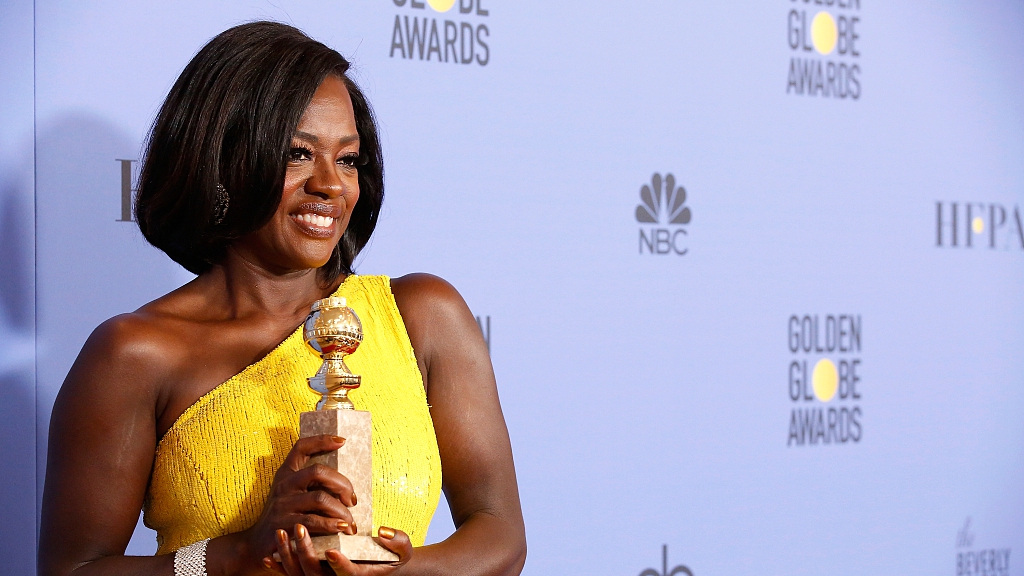
Editor's note: Haider Rifaat is a writer for South China Morning Post, Arabian Moda magazine, Good Times magazine and OK! Pakistan. The article reflects the author's opinions, and not necessarily the views of CGTN.
Hollywood is not all that glitters. While we may see our favorite stars shine big on our television and cinema screens, what goes down behind the scenes is unknown to us all. However, what we do know is that actors of color, specifically African-American artists, are bound to face an enormous pay gap when compared to their counterparts.
What is even more bothersome is the huge pay difference that Black female actors are subject to. We live in an era where women of color should be leaders, and on an equal footing as male actors yet very few celebrities (who aren't Black) haven't been as outspoken about this malpractice in Hollywood.
Just last year, Sofia Vergara was the only non-white woman to be featured in the Forbe's list of the 10 highest paid actresses. With no mention of a Black woman at all, the list predominately consisted of an all-white female lineup with Scarlett Johansson topping the list. Elisabeth Moss, Jennifer Aniston, Margot Robbie, Reese Witherspoon and Nicole Kidman were some other notable A-list names to make the cut.
This hints at the kind of gross inequality that exists for women of color. Under-representation of Black actors is common practice in Hollywood and so is misrepresenting them. Only a small pool of films released in recent years including Black Panther starring the late Chadwick Boseman, Fences and Gemini Men have had Black actors in pivotal roles. The lack of representation does not allow other African-American actors to land heroic characters. Instead, they are assigned supporting roles.

General views of the Hollywood & Highland shopping center enveloped in a yellow-haze amid the ongoing California wildfires on September 10, 2020 in Los Angeles, California. /Getty Images
General views of the Hollywood & Highland shopping center enveloped in a yellow-haze amid the ongoing California wildfires on September 10, 2020 in Los Angeles, California. /Getty Images
To this day, ace actors like Viola Davis and Mo'Nique have made efforts to ensure they get paid equal to their white female counterparts, who get to lead stories more often than usual. Some artists are even younger than Mo'Nique and Viola. In a 2018 interview at the Women in the World forum, Davis revealed how she was not on a par with Meryl Streep, Julianne Moore, and Sigourney Weaver despite having the same credentials as them including a number of accolades: a Tony, Golden Globe, an Oscar and an Emmy. Much of her concern was regarding a dearth of job opportunities and huge pay difference for a Black actor like herself.
Mo'Nique, another Oscar winner, boycotted Netflix the same year Davis gave this insightful interview. She cited color bias and gender bias as chief reasons for wanting to boycott the production company. Amy Schumer, a stand up comedian, was given 13 million dollars for her gig while Mo'Nique was offered a disappointing 500,000 dollars. The discrepancy is loud and clear. Even actress Jessica Chastain helped Octavia Spencer earn five times the income she was originally offered in a comedy film.
It is not as if their Black male counterparts are earning more than them. White actors and actresses surpass African-American actors at large in film and television. How many Marvel Comic projects have had Black actors in key roles, with the exception of Black Panther and the cancelled series Luke Cage?
The community of African-American actors in Hollywood is up against a larger pool of white actors. The competition is fiercer and inequalities are rampant. How long would Black actors have to relive stories of slavery and hood issues? Why can't more actors of color be given the chance to be central characters in mainstream projects? Having a Black man or a woman as the frontrunner in a solid show once or twice a year should no longer impress us unless diversity is fully prioritized.
Hollywood can change the narrative if they identify these major loopholes pertaining to pay gap and lack of opportunities for Black actors. What seems like a good starting point is the need to sustain pay equity between Black and white women working in the entertainment fraternity. The reason why African-American actors choose silence over protest is because the "system" would abandon them, and no actor of color would want that to happen.
(If you want to contribute and have specific expertise, please contact us at opinions@cgtn.com.)